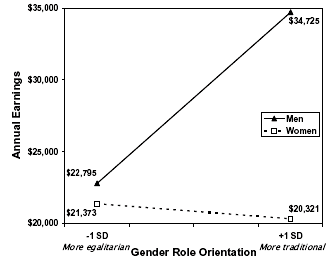THE WAGES OF EGALITARIANISM….We all know that men earn more than women. Is this due to sex discrimination? Or is it caused by differences in educational levels? Or different job preferences? Or average experience levels? Or number of hours worked?
Or, just maybe, none of the above. In a new study by Timothy Judge and Beth Livingston, which attempts to control for gender, age, race, marital status, education, hours worked, number of children, initial earnings, job complexity, and occupational segregation (i.e., the possibility that men on average simply choose more lucrative professions), the authors found that men and women actually earned almost exactly the same amount of money — but only if you compared men and women who had egalitarian notions of gender roles. Under the same circumstances, if you compared men and women with traditional views of gender roles, the men earned a stunning $14,404 more.
What’s more, the big difference isn’t that traditionally minded women, who might be expected to have spent less time in the work force, make all that much less. The big difference is that traditionally minded men make way more money than any of the other three groups — including other men. Shankar Vedantam talks to the authors in the Washington Post today:
Livingston said she was taken aback by the results. “We actually thought maybe men with traditional attitudes work in more complex jobs that pay more or select higher-paying occupations,” she said. “Regardless of the jobs people chose, or how long they worked at them, there was still a significant effect of gender role attitudes on income.”
….Livingston and Judge said there are two possible explanations: Traditional-minded men might negotiate much harder for better salaries, especially when compared with traditional-minded women. Alternatively, it could also be that employers discriminate against women and men who do not subscribe to traditional gender roles.
“It could be that traditional men are hypercompetitive salary negotiators — the Donald Trump prototype, perhaps,” Judge said. “It could be on the employer side that, subconsciously, the men who are egalitarian are seen as effete.”
The standard caveat applies here: it’s really, really hard to control for everything. The controls in this study might not be perfect, and in addition there might be important factors that weren’t included in the controls at all. Livingston and Judge, for example, didn’t directly control for number of years in the workforce. It’s not clear why traditionally-minded men might have more average years in the workforce than egalitarian men, but who knows? They might.
Still, the effect is monstrously huge. Since it turns some of our usual notions of wage disparity upside down, it’s certainly worth some attention.


















